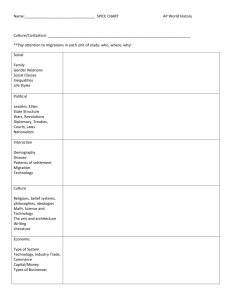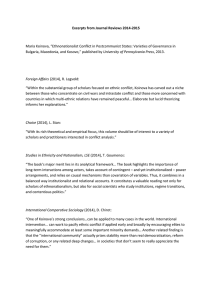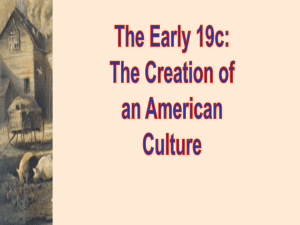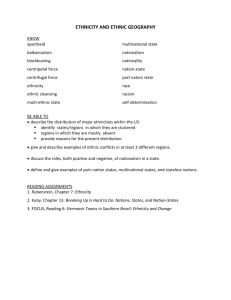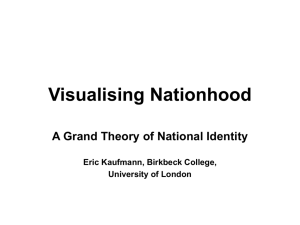Read: Eriksen, Ethnic identity and ideology: 70-94; Ethnicity... David Maybury-Lewis, Ethnic groups: 47-79
advertisement
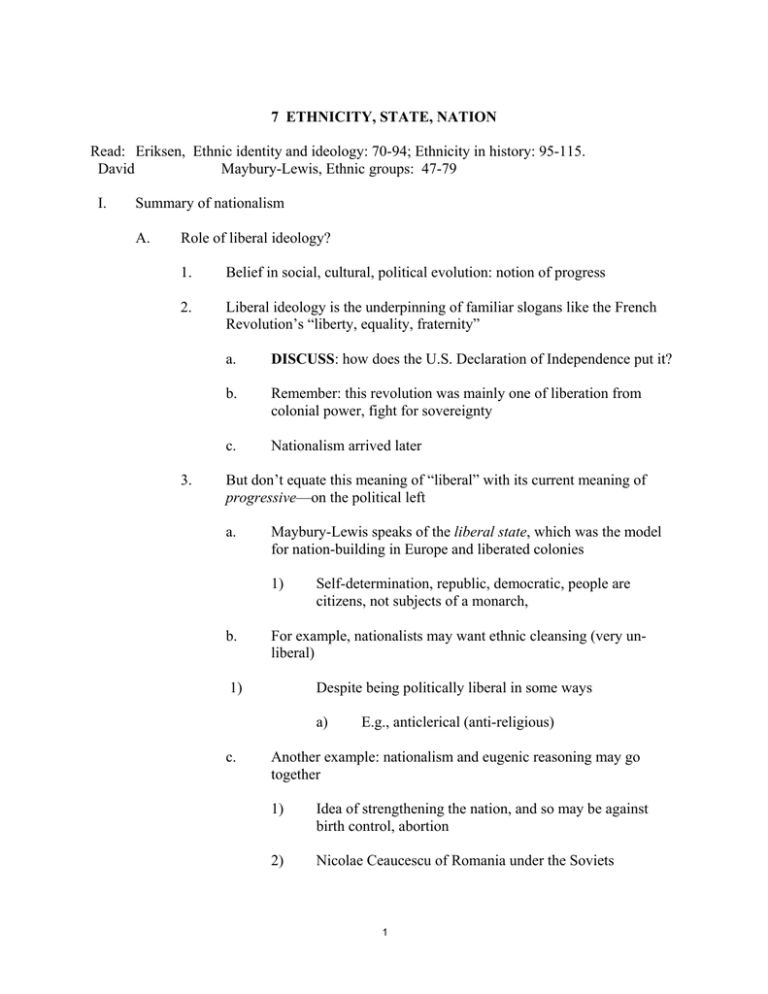
7 ETHNICITY, STATE, NATION Read: Eriksen, Ethnic identity and ideology: 70-94; Ethnicity in history: 95-115. David Maybury-Lewis, Ethnic groups: 47-79 I. Summary of nationalism A. Role of liberal ideology? 1. Belief in social, cultural, political evolution: notion of progress 2. Liberal ideology is the underpinning of familiar slogans like the French Revolution’s “liberty, equality, fraternity” 3. a. DISCUSS: how does the U.S. Declaration of Independence put it? b. Remember: this revolution was mainly one of liberation from colonial power, fight for sovereignty c. Nationalism arrived later But don’t equate this meaning of “liberal” with its current meaning of progressive—on the political left a. Maybury-Lewis speaks of the liberal state, which was the model for nation-building in Europe and liberated colonies 1) Self-determination, republic, democratic, people are citizens, not subjects of a monarch, b. For example, nationalists may want ethnic cleansing (very unliberal) 1) Despite being politically liberal in some ways a) c. E.g., anticlerical (anti-religious) Another example: nationalism and eugenic reasoning may go together 1) Idea of strengthening the nation, and so may be against birth control, abortion 2) Nicolae Ceaucescu of Romania under the Soviets 1 2 B. Characteristics of nationalism1: 1. Is primarily a principle that holds that the political and national unit should be congruent 2. “Nation” is not primary nor an unchanging social entity….is historically grounded, the “nation-state” meaning emerged fairly recently a. 3. Nations are not natural, God-given, etc. a. b. 4. Although nationalist sentiment may contend that “a people” (a nation) have lived a long time in the same place This is why nationalists are so interested in what historians are up to 1) Example of anthropologist Anastasia Karakasidou’s research on Greek Macedonians speaking a Balkan language2 2) She was denounced by the Greek Parliament, and received death threats from Greek nationalists living in New York city Simon Harrison discusses Greek feelings about use of the word “Macedonia” Nationalism sometimes takes preexisting cultures and turns them into nations a. Sometimes invents them b. Often obliterates pre-existing cultures c. DISCUSS: Examples from Eriksen? d. DISCUSS: China and nationalism in Gladney 5. Nationalism comes before nations. Nations do not make states and nationalisms, but the other way around. 6. Nationalism emerges only at a point of intersection of politics, technology and social transformation 1 Hobsbawm agrees with Gellner (1983) in the list that follows. Karakasidou, Anastasia N., 1997. Fields of Wheat, Hills of Blood: Passages to Nationhood in Greek Macedonia, 1870-1990. Chicago: University of Chicago Press. 2 2 3 C. II. a. Particular stage of technological and economic development b. Standard languages cannot emerge before printing; need for mass literacy, mass schooling So, nations are dual phenomena 1. Constructed by political forces 2. But any analysis must include John Stuart Mills’s notion of desire (see Eriksen chapter) a. The role of ordinary people’s assumptions, hopes, needs, longings and interests in the process b. By no means do nationalist activists always accurately represent these feelings 1) DISCUSS: Examples you can think of? 2) Chechnya: activists drew on the repression they suffered under the Soviet Union and post-Soviet Russia 3) Who knows what the majority of Chechnyans felt, or feel at present? 4) It is difficult for a researcher to get at these feelings Pre-modern compared to modern states: brief history A. Pre-modern period 1. Tribes a. DISCUSS : What do you think of when you hear this word? 1) 2) Exotic 3) b. “Other” Examples from the movies? Tribal societies have classically been seen as: 1) Small-scale (not large populations) 3 4 2) With their interaction structured around: a) c. “Tribal” is an anthropological classification, although a problematic one d. Pre-modern, small-scale societies: three types of subsistence modes 1) 2) Hunter-gatherers Horticulturalists a) Gardeners: subsistence mode lacking the plow and draft animals b) 3) 2. 3. Note that horticulturalist societies can in fact be very large—some African kingdoms, for example Nomadic pastoralists Contrast with the great pre-modern dynastic states a. Which were characterized by the fourth subsistence mode, agrarian: plow and draft animals b. “The fertile crescent”: Babylonia, etc. were agrarian Some pre-modern states were horticulturalist a. 4. Kinship networks and face-to-face interaction New World (Aztec, Maya, Inca) In general these great ancient states developed where water was scarce (exception: Maya) a. One hypothesis (overly simple) argues that civilizations developed in arid zones 1) b. Because there was a need to organize to develop the technology that allowed for optimal water distribution As well as develop a socio-political organization that ensured an appropriate distribution 4 5 5. More familiar to us: feudal agrarian states in Europe during the Middle Ages 6. These states were not integrated nationally a. b. Socialization and social control were largely handled locally c. 7. Their subjects were locally integrated, under the rule of a member of the nobility who collected tribute Armies tended to be professional, without the ideology of “moral duty of all to fight for one’s country” that we find in nations Compared with modern nation-states these earlier dynastic states: a. Placed few demands on the majority of their citizens 1) Note: oppression, exploitation could be brutal a) 2) b. c. A. But few demands on them as citizens—not much state bureaucracy No nation-building was needed because the boundaries were always shifting 1) No sense of a need to have populations within the borders share a culture, language 2) The subject populations just needed to be loyal to the rulers, a) Pay taxes b) Consent to be conscripted as labor (e.g., roadbuilding), etc. or for military Pre-modern dynastic kingdoms in Europe weren’t “French” or “British” as they are understood today 1) III.Modern Building Egyptian, Mayan pyramids Inhabitants were subjects to a monarch, not citizens Period Ethnic identity formation and boundary maintenance increase 5 6 1. Ethnic identities tend to attain their greatest importance in situations of a. Flux, potential ambiguity b. Change c. Resource competition d. B. Threats against boundaries Ethnic identity formation and attention to boundary maintenance are found in societies undergoing modernization: 1. Industrializing 2. The scale increases: a large number of people might participate in the same economic system 3. Pre-modern ideologies were based in kinship, feudalism and religion a. 4. IV. In industrial capitalism context, these were no longer capable of organizing people efficiently Eriksen provides a number of examples from Africa showing how ethnic formation changes, adapts Nationalism and ethnicity A. B. Note that “isms” refer to sets of beliefs, theories, ideologies 1. DISCUSS : meaning of “ideology”? 2. Two main—often interrelated—meanings for ideology a. First, a pejorative meaning: a given ideology is in fact an illusion, a set of false ideas b. Second meaning: the set of ideas that arise from a definite social class or group Definitions of the ideology of nationalism? 1. Gellner: a political principle which holds that the political and the national unit should be congruent 6 7 a. C. D. 2. Another: the belief that ethnic boundaries should not cut across political ones 3. Nationalism holds that the political organization should be ethnic in character in that it represents the interests of a particular ethnic group 4. Another definition: ethnic ideologies that hold that their group should dominate a state Benedict Anderson’s characterization of nationalism: it posits an imagined community 1. Imagined because members of nations will never know the vast majority of their fellow members; community because the ideology holds that members share a culture 2. The same goes for large ethnic groups: they are imagined ethnic communities 3. What’s special to the nationalist “imagined community” is that it is seen to be embedded in the state 4. The national state is imagined by its members as both inherently limited and sovereign 5. The ideology holds that members’ loyalty and attachment should be directed towards the state and the legislative system So, nationalism is an ideology about culture and power 1. Self-conscious culture a. 2. By now we understand that nation-building requires “talk about culture” Nationalism reifies culture—DISCUSS a. E. But, asks Eriksen, what is “the national unit”? Enables people to talk about their culture as though it were a thing, a constant Additional discussion of theories about the causes of the rise of nationalism 1. All scholars mention the role played by modernization 7 8 2. All scholars mention the role played by industrialization 3. An article by Segal and Handler3 argues that the rise of nationalism in Europe and the Americas must be seen in the larger context of colonization a. They insist that analyses of nationalism must look at the entire global picture b. They provide a critique of Euro-centric views of the development of nationalism c. They argue that all analyses of nationalism have to examine the political economy of colonialism and the role of racial ideologies in justifying it d. For instance, they argue that we cannot look at British nationalism’s evolution 1) 4. Also, various authors, in addition to Segal and Handler, argue that much of the theoretical characterization of nationalism does not fit the nationbuilding processes that take place in former colonies a. 5. For example, Eriksen’s example of Trinidad: its nationalism is built, not on autochthonous, indigenous people and their culture, nor on ancient folkways being re-discovered 1) But built on forging a nation out of two immigrant populations: African and E. Indian 2) Nationalism consequently looks very different in countries like Trinidad 3) DISCUSS: Eriksen’s discussion of the changing ethnic formation of East Indians and Blacks in Trinidad? A new kind of nationalist ideology is required if former colonies are to successfully develop into nation-states a. 3 Without looking at Ireland as a colony; at Britain’s Atlantic coast colonies; at the British West Indies If they are to be capable of creating cohesion and loyalties Daniel Segal and Richard Handler, 1992. How European is nationalism? Social Analysis 32: 1-15. 8 MIT OpenCourseWare http://ocw.mit.edu 21A.226 Ethnic and National Identity Fall 2011 For information about citing these materials or our Terms of Use, visit: http://ocw.mit.edu/terms.
![“The Progress of invention is really a threat [to monarchy]. Whenever](http://s2.studylib.net/store/data/005328855_1-dcf2226918c1b7efad661cb19485529d-300x300.png)

